| Listing 1 - 8 of 8 |
Sort by
|
Book
ISBN: 0198770820 9780198770824 Year: 1976 Publisher: London: Oxford university press,
Abstract | Keywords | Export | Availability | Bookmark
 Loading...
Loading...Choose an application
- Reference Manager
- EndNote
- RefWorks (Direct export to RefWorks)
Quantitative methods (economics) --- Economics, Mathematical --- Mathematical optimization --- 330.105 --- 519.8 --- 330.115 --- Optimization (Mathematics) --- Optimization techniques --- Optimization theory --- Systems optimization --- Mathematical analysis --- Maxima and minima --- Operations research --- Simulation methods --- System analysis --- Economics --- Mathematical economics --- Econometrics --- Mathematics --- Wiskundige economie. Wiskundige methoden in de economie --- Operational research --- Kwantitatieve methoden (economie) --- Methodology --- 519.8 Operational research --- 330.105 Wiskundige economie. Wiskundige methoden in de economie
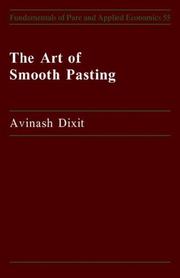
ISBN: 9783718653843 3718653842 9781315870786 9781317973713 9781317973720 9781317973737 9780415269377 0415269377 Year: 1993 Volume: 55 Publisher: London : Routledge,
Abstract | Keywords | Export | Availability | Bookmark
 Loading...
Loading...Choose an application
- Reference Manager
- EndNote
- RefWorks (Direct export to RefWorks)
Economics, Mathematical --- Brownian motion processes --- 330.0151 --- Wiener processes --- Brownian movements --- Fluctuations (Physics) --- Markov processes --- Economics --- Mathematical economics --- Econometrics --- Mathematics --- Methodology --- Brownian motion processes. --- Economics, Mathematical. --- Mathématiques économiques --- Mouvement brownien, processus de --- Probabilités
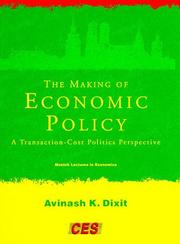
ISBN: 0262041553 0585028923 9780585028927 9780262271790 0262271796 9780262041553 Year: 1996 Publisher: Cambridge (MA) ; London : M.I.T. Press,
Abstract | Keywords | Export | Availability | Bookmark
 Loading...
Loading...Choose an application
- Reference Manager
- EndNote
- RefWorks (Direct export to RefWorks)
Economic policy --- Transaction costs --- Frais de transaction --- Transaction costs. --- Economic policy. --- Politique économique --- 338.9 --- #abib:aleo --- 321.2 --- 331.21 --- AA / International- internationaal --- Economic nationalism --- Economic planning --- National planning --- State planning --- Economisch beleid van de overheid --- Geschiedenis van de demografie --- Cost --- Externalities (Economics) --- Right of property --- Economics --- Planning --- National security --- Social policy
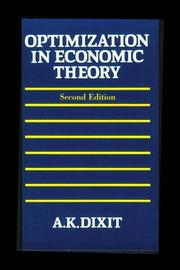
ISBN: 0198772106 0198772114 9780198772101 9780198772118 Year: 1990 Publisher: Oxford : Oxford University Press,
Abstract | Keywords | Export | Availability | Bookmark
 Loading...
Loading...Choose an application
- Reference Manager
- EndNote
- RefWorks (Direct export to RefWorks)
AA / International- internationaal --- 305.976 --- 330.00 --- 330.3 --- Algoritmen. Optimisatie. --- Economische en sociale theorieën: algemeenheden. --- Methode in staathuishoudkunde. Statische, dynamische economie. Modellen. Experimental economics. --- Quantitative methods (economics) --- Economics, Mathematical --- Mathematical optimization --- Algoritmen. Optimisatie --- Economische en sociale theorieën: algemeenheden --- Methode in staathuishoudkunde. Statische, dynamische economie. Modellen. Experimental economics
Book
Year: 1985 Publisher: Stockholm: University of Stockholm. Institute for international economic studies,
Abstract | Keywords | Export | Availability | Bookmark
 Loading...
Loading...Choose an application
- Reference Manager
- EndNote
- RefWorks (Direct export to RefWorks)
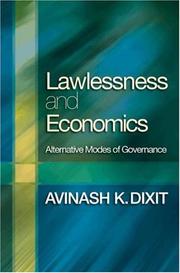
ISBN: 0691114862 0691130345 9786613303332 1283303337 1400841372 9780691114866 9781400841370 9780691130347 Year: 2004 Publisher: Princeton, N.J. : Princeton University Press,
Abstract | Keywords | Export | Availability | Bookmark
 Loading...
Loading...Choose an application
- Reference Manager
- EndNote
- RefWorks (Direct export to RefWorks)
How can property rights be protected and contracts be enforced in countries where the rule of law is ineffective or absent? How can firms from advanced market economies do business in such circumstances? In Lawlessness and Economics, Avinash Dixit examines the theory of private institutions that transcend or supplement weak economic governance from the state. In much of the world and through much of history, private mechanisms--such as long-term relationships, arbitration, social networks to disseminate information and norms to impose sanctions, and for-profit enforcement services--have grown up in place of formal, state-governed institutions. Even in countries with strong legal systems, many of these mechanisms continue under the shadow of the law. Numerous case studies and empirical investigations have demonstrated the variety, importance, and merits, and drawbacks of such institutions. This book builds on these studies and constructs a toolkit of theoretical models to analyze them. The models shed new conceptual light on the different modes of governance, and deepen our understanding of the interaction of the alternative institutions with each other and with the government's law. For example, one model explains the limit on the size of social networks and illuminates problems in the transition to more formal legal systems as economies grow beyond this limit. Other models explain why for-profit enforcement is inefficient. The models also help us understand why state law dovetails with some non-state institutions and collides with others. This can help less-developed countries and transition economies devise better processes for the introduction or reform of their formal legal systems.
Economic policy --- Corporate governance --- Contracts --- Right of property --- Corporation law --- Business enterprises --- International Cooperation --- Law and legislation --- Developing countries --- Contracts. --- Corporate governance. --- Corporation law. --- Economic policy. --- International cooperation. --- Right of property. --- Law and legislation. --- Economic analysis of law --- Economic order --- Politique économique --- Gouvernement d'entreprise --- Contrats --- Droit de propriété --- Sociétés --- Entreprises --- Coopération internationale --- Droit --- Pays en développement --- Business organizations --- Businesses --- Companies --- Enterprises --- Firms --- Organizations, Business --- Business --- Company law --- Corporate law --- Corporations --- Law, Corporation --- Trusts, Industrial --- Commercial law --- Ownership of property --- Private ownership of property, Right of --- Private property, Right of --- Property, Right of --- Property rights --- Right of private ownership of property --- Right of private property --- Right to property --- Civil rights --- Property --- Agreements --- Contract law --- Contractual limitations --- Limitations, Contractual --- Legal instruments --- Obligations (Law) --- Juristic acts --- Liberty of contract --- Third parties (Law) --- Governance, Corporate --- Industrial management --- Directors of corporations --- Cooperation, International --- Global governance --- Institutions, International --- Interdependence of nations --- International institutions --- World order --- Cooperation --- International relations --- International organization --- Economic nationalism --- Economic planning --- National planning --- State planning --- Economics --- Planning --- National security --- Social policy --- Law --- International cooperation --- 330.1 --- Ea1 --- 330.52 --- AA / International- internationaal --- 338.22 --- 338.22 Economische organisatieleer. Economisch beleid. Economische politiek --- Economische organisatieleer. Economisch beleid. Economische politiek --- Liberaal systeem. Neo-liberalisme. Theorie van de onderhandeling --- Business enterprises - Law and legislation --- Corporate governance - Developing countries --- Contracts - Developing countries --- Right of property - Developing countries --- Corporation law - Developing countries --- Business enterprises - Law and legislation - Developing countries --- Developing countries - Economic policy
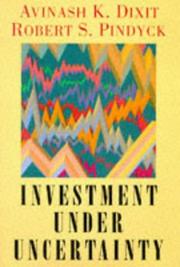
ISBN: 0691034109 9786613379559 1283379554 1400830176 9780691034102 Year: 1994 Publisher: Princeton (New Jersey) : Princeton University Press,
Abstract | Keywords | Export | Availability | Bookmark
 Loading...
Loading...Choose an application
- Reference Manager
- EndNote
- RefWorks (Direct export to RefWorks)
How should firms decide whether and when to invest in new capital equipment, additions to their workforce, or the development of new products? Why have traditional economic models of investment failed to explain the behavior of investment spending in the United States and other countries? In this book, Avinash Dixit and Robert Pindyck provide the first detailed exposition of a new theoretical approach to the capital investment decisions of firms, stressing the irreversibility of most investment decisions, and the ongoing uncertainty of the economic environment in which these decisions are made. In so doing, they answer important questions about investment decisions and the behavior of investment spending. This new approach to investment recognizes the option value of waiting for better (but never complete) information. It exploits an analogy with the theory of options in financial markets, which permits a much richer dynamic framework than was possible with the traditional theory of investment. The authors present the new theory in a clear and systematic way, and consolidate, synthesize, and extend the various strands of research that have come out of the theory. Their book shows the importance of the theory for understanding investment behavior of firms; develops the implications of this theory for industry dynamics and for government policy concerning investment; and shows how the theory can be applied to specific industries and to a wide variety of business problems.
658.168 --- 658.143 --- theories economiques --- investissements des entreprises --- marches financiers --- AA / International- internationaal --- 339.312.3 --- 339.312.0 --- 339.312.2 --- bedrijfsinvesteringen --- economische conjunctuur --- investeringstheorie --- 658.1554 --- Capital investments --- -Capital investments --- -658.168 Capital increase and reduction. Financial reconstruction. Fusion --- Capital increase and reduction. Financial reconstruction. Fusion --- Capital expenditures --- Capital improvements --- Capital spending --- Fixed asset expenditures --- Plant and equipment investments --- Plant investments --- Investeringsbeleid --- economische theorieen --- financiele markten --- Financiering van de bedrijven. --- Investeringen: algemeenheden. --- Maatstaven voor de beslissingen van investeringen. --- Decision making --- Decision making. --- Investissements de capitaux --- Prise de décision --- -Capital expenditures --- 658.168 Capital increase and reduction. Financial reconstruction. Fusion --- Investeringen: algemeenheden --- Maatstaven voor de beslissingen van investeringen --- Financiering van de bedrijven --- Finances --- Investissements de capitaux. --- Incertitude (economie politique) --- Calcul economique --- Investissements --- Prise de decision. --- Options (finances) --- Contrats d'options --- Marchés à options --- Marchés d'options --- Marchés des options négociables --- MONEP --- Opérations à option --- Options d'achat (finances) --- Options de vente (finances) --- Options négociables --- Stellage --- Options --- Couverture --- Options réelles (finances) --- Marchés d'indices boursiers --- Option de change --- Options sur actions --- Options exotiques --- Bourse --- Bourses de marchandises --- Option (contrat) --- Instruments dérivés (finances) --- Cadrage (décision) --- Décision, Prise de --- Décision, Théorie de la --- Décision (psychologie) --- Processus de décision --- Processus décisionnel --- Théorie de la décision --- , Systèmes de --- , Méthode --- (psychologie) --- Modèle de fixation du prix des actifs --- Multiplicateur (économie politique) --- Décision économique, Prise de --- Rationalisation des choix budgétaires --- Coût-efficacité --- Gestion d'entreprise --- Prise de décision --- Risque financier --- Analyse stratégique --- Anticipations rationnelles, Théorie des --- Capital --- Capitaux, Investissements de --- Dépenses d'équipement --- Dépenses en capital --- Entreprises --- Investissements industriels --- Investissements manufacturiers --- Investissements de remplacement --- Hôpitaux --- Budget d'investissement --- Coût du capital --- Crédit d'impôt à l'investissement --- Équipement industriel --- Investissements immatériels --- Rentabilité --- Modeles mathematiques. --- finances) -- Évaluation --- finances --- philosophie --- Renouvellement --- Nudge --- Tirage au sort --- Choix --- Rationalité managériale --- Résolution de problème --- Volonté --- Effectuation --- Théorie de la dépendance au sentier --- Dilemme --- Paradoxe d'Allais --- Programmation linéaire --- Recherche opérationnelle --- Systèmes d'aide à la décision --- Tables de décision --- Théorie des jeux --- Arbres de décision --- Calcul économique --- Choix collectif --- Commandement et conduite des opérations, Systèmes de --- Décision de groupe --- Décision multicritère --- Delphi, Méthode --- Choix (psychologie) --- Investment management
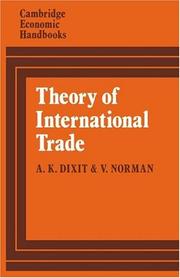
ISBN: 113988154X 1107712955 1107712637 1107720001 1107715873 0511937490 0511628625 9781107720008 9780511628627 9780511937491 0521299691 9780521299695 0521234816 9780521234818 0720203147 9780720203141 0720203155 9780720203158 Year: 1980 Publisher: Welwyn : [Cambridge] : J. Nisbet ; Cambridge University Press,
Abstract | Keywords | Export | Availability | Bookmark
 Loading...
Loading...Choose an application
- Reference Manager
- EndNote
- RefWorks (Direct export to RefWorks)
This book expounds trade theory emphasizing that a trading equilibrium is general rather than partial, and is often best modelled using dual or envelope functions. This yields a compact treatment of standard theory, clarifies some errors and confusions, and produces some new departures. In particular, the book (i) gives unified treatments of comparative statics and welfare, (ii) sheds new light on the factor-price equalization issue, (iii) treats the modern specific-factor model in parallel with the usual Heckscher-Ohlin one, (iv) analyses the balance of payments in general equilibrium with flexible and fixed prices, (v) studies imperfect competition and intra-industry trade.
International trade --- Mathematical models. --- 339.5 --- AA / International- internationaal --- 382.10 --- Buitenlandse handel. Internationale handel. Ruilvoet --- Theorieën van internationale en interregionale handel: algemeenheden. Comparatieve voordelen --- 339.5 Buitenlandse handel. Internationale handel. Ruilvoet --- Mathematical models --- International economic relations --- Economics --- Equilibrium (Economics) --- Economie politique --- Equilibre (Economie politique) --- Relations économiques internationales --- Business, Economy and Management --- International trade - Mathematical models
| Listing 1 - 8 of 8 |
Sort by
|

 Search
Search Feedback
Feedback About UniCat
About UniCat  Help
Help News
News